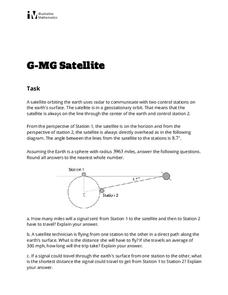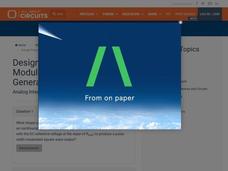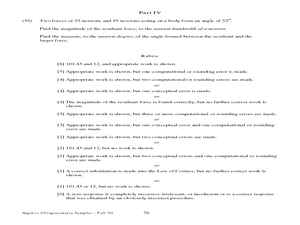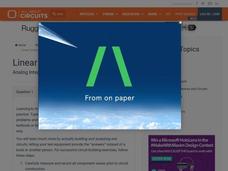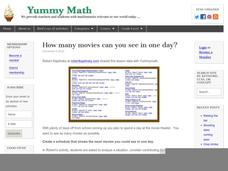5280 Math
Multiplication Table Algebra
Patterns, patterns, everywhere! Young scholars examine the multiplication table to identify patterns. Their exploration leads to an understanding of the difference of squares and sum of cubes by the completion of the algebra project.
Illustrative Mathematics
Satellite
Learners practice relating rules of trigonometry and properties of circles. With a few simplifying assumptions such as a perfectly round earth, young mathematicians calculate the lengths of various paths between satellite and stations....
Balanced Assessment
Disc-Ness
Transform your scholars into mathematicians as they develop their own geometric definition. The task asks individuals to compare cylindrical objects and create a definition for the disc-ness of each object. They may use any method and...
New York State Education Department
TASC Transition Curriculum: Workshop 7
Designed specifically for math instructors, the seventh workshop of a 15-part series allows time to explore Webb's DOK, ponder open-ended questions, and create lessons to apply what is learned. Teachers craft high-quality math problems...
Concord Consortium
Square-Ness
Are there some rectangles that are more square than others? A thought-provoking task asks individuals to create a formula that objectifies the square-ness of a set of rectangles. They then use their formulas to rank a set of rectangles.
DK Publishing
A Burning Matter
The process of fire requires oxygen, heat, and fuel. Take one of those away, and fire ceases to exist. That's the idea behind this worksheet which portrays a candle burning inside an upside down jar. Pupils answer a couple of questions...
Illustrative Mathematics
Sale!
Everyone loves a sale, and this worksheet allows learners to calculate which sale is more rewarding. The activity can be adapted for different thinking contexts. The answer key describes different answer choices, some being higher...
Curated OER
Algebraic Equation Manipulation for Electric Circuits
In this electric circuit instructional activity, learners use Algebraic equations to manipulate the electrical resistance of a conductor. The answer a series of 19 open-ended questions. This instructional activity is printable and the...
Curated OER
Special Diodes
For this electrical circuit worksheet, students draw a schematic design and build a circuit board to grasp the understanding of diodes. Students answer a series of 8 open-ended questions. This worksheet is printable and there are on-line...
Curated OER
Class B BJT Amplifiers
In this electrical circuit worksheet, students draw a schematic design and build a transmitter to grasp the understanding of bipolar junction transmitters before answering a series of 12 open-ended questions by analyzing schematic...
Curated OER
Bipolar Junction Transistor Theory
In this electrical worksheet, students draw a schematic design and build a bipolar transistor to grasp the understanding of bipolar junction transistor theory before answering a series of 28 open-ended questions. Students analyze...
Curated OER
Series DC Circuits
In this electrical worksheet, students answer a series of 27 open-ended questions pertaining to DC circuits by analyzing electrical schematics. This worksheet is printable and there are on-line answers to the questions.
Curated OER
Pulse-Width Modulation Signal Generator
In this electrical instructional activity, students answer a series of 6 open-ended questions about pulse-width signal generators. This instructional activity is printable and the answers are revealed online.
Curated OER
Resonance
In this electrical worksheet, students draw a schematic design and build a circuit board capable of producing a wide range of audio-frequency AC signals before answering a series of 26 open-ended questions. This worksheet is printable...
Curated OER
Active Loads in Amplifier Circuits
For this electrical worksheet, students answer a series of 7 open-ended questions with schematics about active loads in amplifier circuits. This worksheet is printable and the answers are available on-line.
NFPA
Sparky's Birthday Surprise
Fire safety is a hot topic for kids! With this resource, little ones will read, color, draw, and play as they are learning about prevention and, as an added bonus, practice naming shapes, counting, and adding numbers! Reading, math, and...
Curated OER
MT-A314 Introduction to Linear Algebra Worksheet 1.4(b)
A linear algebra worksheet where pupils explore three linear equations and use Gaussain elimination to solve the system of equations. They identify values that have no solution, one solution, and many solutions. There is one open-ended,...
Curated OER
Scoring Guide for the Algebra 2/Trigonometry Test Sampler
Students take an Algebra II/Trigonometry sample test. In this Algebra II/Trigonometry sample sample test lesson plan, students take a sample test for Algebra 2/Trigonometry. Students solve 39 multiple choice/short answer questions...
Curated OER
Linear Computational Circuitry
In this electrical worksheet, students draw a schematic design circuit board to grasp the understanding amplification in linear circuitry before answering a series of 35 open-ended questions pertaining to a variety of linear circuitry....
Curated OER
Millman's Theorem
In this electrical circuit lesson, students will answer 9 open ended questions to mathematically analyze circuits for current and voltage. This online worksheet provides diagrams for better understanding and reveals the answers.
EngageNY
The Geometric Effect of Some Complex Arithmetic 1
Translating complex numbers is as simple as adding 1, 2, 3. In the ninth lesson in a 32-part series, the class takes a deeper look at the geometric effect of adding and subtracting complex numbers. The resource leads pupils into what it...
Curated OER
How many movies can you see in one day?
For kids who love movies, figuring out a schedule for the maximum number that can be seen in one day is not only a good demonstration of Common Core mathematical practices, but also a highly motivating activity. Robert Kaplinsky...
Illustrative Mathematics
The Djinni’s Offer
The djinni in this resource offers gold coins. Learners use the properties of exponents to make their decision as one offer increases exponentially. This makes a great group project. As the commentary suggests, start by having groups...
EngageNY
Why Do Banks Pay YOU to Provide Their Services?
How does a bank make money? That is the question at the based of a lesson that explores the methods banks use to calculate interest. Groups compare the linear simple interest pattern with the exponential compound interest pattern.



